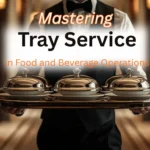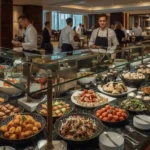In the competitive hospitality industry, experienced waiters and waitresses play a vital role in ensuring smooth, professional service and excellent guest experiences. When interviewing for such positions, employers expect candidates not only to have solid technical skills but also the ability to handle challenges with professionalism, efficiency, and grace.
This article provides a detailed guide to the 30 most common interview questions for experienced waiters and waitresses, along with insightful answers. It is designed to help you showcase your expertise, problem-solving abilities, and dedication to the craft of hospitality.
Whether you are a hotel management student preparing for your career or a professional looking to upgrade your job, this guide will prepare you to confidently navigate your next job interview.
If you’re just starting your F&B career, also check out our interview questions and answers for freshers.
General Interview Tips for Experienced Waiters and Waitresses
Before diving into specific questions, it is essential to understand how to present yourself effectively in an interview as an experienced professional:

1. Professional Grooming and Appearance
Your appearance reflects your professionalism. Wear clean, well-pressed uniforms or business casual attire appropriate to the restaurant or hotel culture. Ensure good personal hygiene, neat hair, and polished shoes. First impressions count.
2. Highlight Your Relevant Work Experience
Bring your updated resume highlighting your experience in various service settings — fine dining, casual, banquets, or hotels. Be ready to discuss specific roles, responsibilities, and achievements.
3. Demonstrate Confidence and Composure
Experienced candidates are expected to handle pressure and unexpected situations calmly. Practice answering questions confidently, emphasising your ability to remain composed during busy hours.
4. Showcase Your Customer Service Excellence
Illustrate your commitment to guest satisfaction with examples of problem-solving, upselling, and personalised service that enhanced guest experiences.
5. Prepare Examples of Leadership or Teamwork
If you’ve mentored junior staff or contributed to team efficiency, be prepared to discuss these experiences.
Don’t know where to start with your resume? These ready-to-use resume templates will help you stand out from the crowd.
Interview Questions and Best Answers for Experienced Waiters/Waitresses
Each question below includes the reason interviewers ask it, what they expect from you, and a strong sample answer demonstrating professionalism and experience.
1. Tell me about your previous experience as a waiter/waitress
Why interviewers ask this question:
This question helps interviewers assess your communication skills, confidence, and how your academic background and work experience align with the role. They want to see if you’re self-aware, passionate about hospitality, and ready to contribute effectively from the start.
What a waiter/waitress should focus on:
- Educational background (if relevant, such as hotel management)
- Practical training or internships (especially in F&B service)
- Real-world work experience (restaurant, hotel, or banquet)
- Key responsibilities, soft skills, and any leadership roles
- Enthusiasm for service and professional growth
Sample Answer:
“I am a graduate in Hotel Management from [ABC Institute of Hospitality Management], where I developed a strong passion for food and beverage service. As part of my studies, I completed a six-month industrial training at [XYZ Hotel], gaining hands-on experience in different F&B outlets, including banquets and à la carte service. After graduating, I began working full-time and now have over four years of experience in upscale restaurants and hotel dining environments. In my previous roles, I’ve handled everything from welcoming guests and managing complex orders to upselling premium items and ensuring guest satisfaction. I also took on responsibilities like mentoring new staff and supporting service coordination during large events. My education gave me the foundation, and my experience has helped me refine my skills under pressure. I’m now looking to bring that blend of professionalism and passion to a team that values excellent service.”
2. What are your key strengths as an experienced server?
Why interviewers ask this: To identify your unique selling points.
What they expect: Traits like communication, multitasking, and customer service.
Sample answer:
My key strengths include strong communication skills, attention to detail, and the ability to stay calm and organised during peak hours. I am also skilled at reading guests’ needs and suggesting menu items that enhance their dining experience.”
3. How do you handle difficult or demanding customers?
Why interviewers ask this: Customer interaction is critical; they want to see your problem-solving skills.
What they expect: Patience, diplomacy, and professionalism.
Sample answer:
I listen carefully to the customer’s concerns without interrupting and remain calm. I empathise with their situation and work quickly to find a satisfactory solution, whether that involves replacing a dish or escalating the issue to management if necessary.”
4. Can you describe a time when you went above and beyond for a guest?
Why interviewers ask this: To assess your dedication and service mindset.
What they expect: Real examples that demonstrate initiative.
Sample answer:
“Once, a guest mentioned it was their anniversary, and I coordinated with the kitchen and management to prepare a complimentary dessert and personalised note. The guest was very appreciative, and it enhanced their overall experience, which they later praised in a review.”
5. How do you stay motivated during long shifts?
Why interviewers ask this: To evaluate your endurance and passion.
What they expect: Positive attitude and coping strategies.
Sample answer:
I stay motivated by focusing on the guests’ happiness and the team spirit. Taking short breaks when possible and keeping a positive mindset helps me stay energised throughout the shift.
6. What do you know about upselling, and how have you used it?
Why interviewers ask this: Upselling increases revenue and reflects product knowledge.
What they expect: Understanding of upselling techniques.
Sample answer:
“Upselling involves suggesting higher-value or additional items in a friendly, non-pushy way. I have successfully recommended appetisers, drinks, and desserts by highlighting their flavours and pairing suggestions, which often increases the guest’s satisfaction and the restaurant’s sales.”
7. How do you handle complaints about food or service?
Why interviewers ask this: To test your conflict management.
What they expect: Calm, solution-oriented approach.
Sample answer:
“I apologise sincerely for the inconvenience, listen carefully to understand the issue, and offer an immediate solution, such as replacing the dish or involving the manager if necessary. My goal is always to turn the guest’s experience around.”
Also, learn how to professionally manage guest complaints with our guide to handling complaints in food and beverage service.
8. Have you ever trained or mentored new staff?
Why interviewers ask this: Experience in leadership is valuable.
What they expect: Examples of guiding others.
Sample answer:
“Yes, I’ve trained several new servers in my previous role, focusing on service standards, POS operation, and guest interaction. I believe mentoring helps maintain consistency and improves team performance.”
9. How do you manage working with a difficult team member?
Why interviewers ask this: To see your teamwork and conflict resolution skills.
What they expect: Professionalism and communication.
Sample answer:
“I maintain open and respectful communication, try to understand their perspective, and focus on shared goals. If issues persist, I escalate to the supervisor while ensuring service quality is not affected.”
10. How do you prioritise tasks during busy service hours?
Why interviewers ask this: Time management is critical in hospitality.
What they expect: Ability to multitask and prioritise efficiently.
Sample answer:
“I prioritise tasks based on urgency and guest needs, attend to high-impact activities first, and communicate with the team to ensure no table is neglected. Staying organised helps me maintain a smooth workflow.”
11. What do you do to ensure accuracy in orders?
Why interviewers ask this: Order accuracy is essential for guest satisfaction.
What they expect: Attention to detail and verification.
Sample answer:
“I listen carefully, repeat the order back to the guest to confirm, note any special requests, and double-check the order before submitting it to the kitchen.”
12. Can you describe your experience with POS systems?
Why interviewers ask this: Familiarity with technology is crucial.
What they expect: Ability to use POS effectively.
Sample answer:
“I have extensive experience using various POS systems for order entry, billing, and payment processing. I am comfortable troubleshooting basic issues and ensuring smooth transactions.”
13. How do you maintain hygiene and safety standards?
Why interviewers ask this: To ensure compliance with health regulations.
What they expect: Knowledge of protocols and personal responsibility.
Sample answer:
“I follow all hygiene protocols, including handwashing, wearing clean uniforms, and sanitising workstations regularly. I also adhere to food safety standards to prevent contamination and maintain a safe environment for guests and staff.”
14. What steps do you take to ensure repeat business from guests?
Why interviewers ask this: Repeat customers are vital for business success.
What they expect: Ability to build rapport and loyalty.
Sample answer:
“I engage guests warmly, remember their preferences when possible, and provide consistent, attentive service. Follow-ups during the meal and thanking them sincerely when they leave help create a positive impression.”
15. How do you handle last-minute changes in the menu or seating arrangements?
Why interviewers ask this: Flexibility and quick thinking are important.
What they expect: Adaptability and communication skills.
Sample answer:
“I stay updated on menu changes and communicate them clearly to guests. For seating adjustments, I coordinate with the host and team to manage expectations and minimise disruption.”
16. Describe a time when you handled a medical or emergency situation at work.
Why interviewers ask this: To assess your crisis management skills.
What they expect: Calmness and proper protocol adherence.
Sample answer:
“Once, a guest experienced an allergic reaction. I stayed calm, alerted management, and assisted in calling emergency services while keeping the guest comfortable until help arrived.”
17. How do you handle multitasking when managing several tables?
Why interviewers ask this: To see your organisational skills.
What they expect: Efficiency and prioritisation.
Sample answer:
“I use a system to track orders and guest needs, prioritise urgent tasks, and communicate with kitchen and colleagues to ensure timely service across all tables.”
18. How do you upsell wine or drinks?
Why interviewers ask this: To evaluate product knowledge and sales ability.
What they expect: Knowledge of pairing and persuasive skills.
Sample answer:
“I recommend wines based on guest preferences and meal choices, describe their flavours, and suggest pairings. For example, recommending a crisp white wine with seafood to enhance the dining experience.”
19. How do you balance speed and quality during rush hours?
Why interviewers ask this: To ensure you maintain standards under pressure.
What they expect: Ability to maintain service quality while working fast.
Sample answer:
“I focus on staying organised and calm, ensuring orders are correct before sending them, and managing time efficiently to keep service both quick and high-quality.”
20. How do you handle stress or burnout?
Why interviewers ask this: To check your resilience.
What they expect: Healthy coping strategies.
Sample answer:
“I manage stress by taking brief moments to breathe, staying focused on the task, and relying on team support. Outside work, I ensure good rest and exercise to maintain my energy.”
21. How do you ensure team communication during shifts?
Why interviewers ask this: Teamwork depends on communication.
What they expect: Clear communication and collaboration.
Sample answer:
“I use briefings before shifts and ongoing updates during service to coordinate with team members, ensuring everyone is aware of priorities and guest needs.”
22. Describe a challenging guest interaction and how you resolved it.
Why interviewers ask this: To test problem-solving and customer service skills.
What they expect: Ability to remain professional and find solutions.
Sample answer:
“A guest was upset about a delayed order. I apologised, explained the situation, offered a complimentary appetiser, and ensured their meal arrived promptly, which calmed the guest and led to positive feedback.”
23. What do you think makes excellent customer service?
Why interviewers ask this: To assess your customer service philosophy.
What they expect: Understanding of service quality.
Sample answer:
“Excellent customer service is about anticipating guest needs, being attentive and courteous, and resolving issues promptly to create a memorable experience.”
24. How do you handle feedback or criticism from supervisors?
Why interviewers ask this: To assess your growth mindset.
What they expect: Openness and willingness to improve.
Sample answer:
“I welcome constructive criticism as an opportunity to learn and improve. I reflect on feedback and apply it to enhance my performance.”
25. What would you do if you noticed a coworker not following hygiene protocols?
Why interviewers ask this: To check your responsibility and teamwork.
What they expect: A Professional approach to sensitive situations.
Sample answer:
“I would discreetly remind my coworker about the protocols and, if necessary, report the issue to a supervisor to maintain standards without causing conflict.”
26. How do you deal with cash handling and billing errors?
Why interviewers ask this: Accuracy and honesty in transactions are crucial.
What they expect: Integrity and problem-solving skills.
Sample answer:
“I double-check bills before presenting them to guests to minimise errors. If I notice a billing mistake, I immediately inform my supervisor and correct it promptly. Transparency and honesty are important to maintain guest trust.”
27. Can you describe your experience with handling special dietary requirements?
Why interviewers ask this: To ensure you can accommodate guests’ health needs.
What they expect: Knowledge and attentiveness.
Sample answer:
“I always carefully note guests’ dietary restrictions, allergies, or preferences. I communicate clearly with the kitchen to ensure their needs are met without cross-contamination, and I check back with guests to ensure satisfaction.”
28. How do you maintain professionalism when dealing with personal conflicts at work?
Why interviewers ask this: To assess your workplace behaviour.
What they expect: Ability to separate personal and professional matters.
Sample answer:
“I keep personal issues separate from work and focus on the job. I communicate respectfully, avoid gossip, and if needed, seek mediation from management to resolve conflicts professionally.”
29. What strategies do you use to remember regular guests’ preferences?
Why interviewers ask this: To see how you build guest relationships.
What they expect: Attentiveness and memory techniques.
Sample answer:
“I make mental or discreet notes about guests’ favourite dishes and drinks, and try to greet them personally by name when possible. This personal touch helps build rapport and loyalty.”
30. Why do you want to work with our restaurant/hotel?
Why interviewers ask this: To check your motivation and fit.
What they expect: Genuine interest and knowledge about their brand.
Sample answer:
“I admire your establishment’s commitment to quality service and innovation in hospitality. I believe my experience and dedication to excellent guest service align well with your values, and I’m excited about contributing to your team’s success.”
Conclusion
Preparing well for an interview as an experienced waiter or waitress can significantly boost your chances of landing the job. By understanding the typical questions and formulating thoughtful answers based on your own experiences, you demonstrate professionalism, competence, and passion for hospitality. Remember to highlight your skills in customer service, teamwork, problem-solving, and adaptability.
Good preparation, along with a confident and positive attitude, will help you shine in your next interview and take your hospitality career to the next level.
Subscribe and join our community of hospitality professionals & students — get insights, tips, and the latest updates delivered straight to your inbox!







